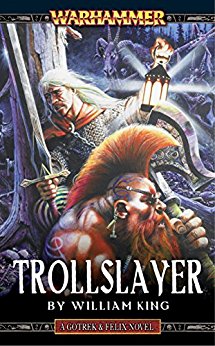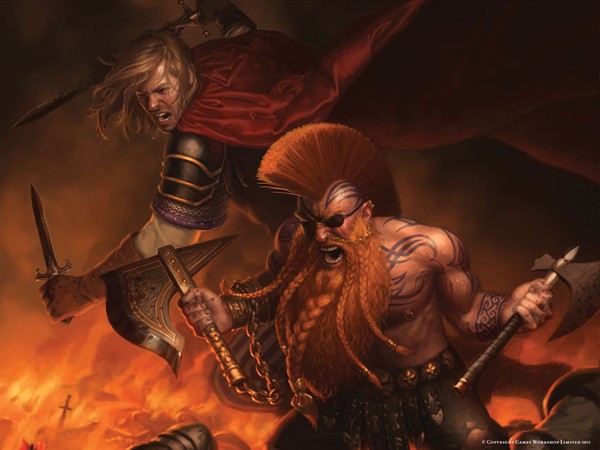
“I am robbed of a mighty death, manling.” – Gotrek Gurnisson
In “Geheimnisnacht”, the first story in William King’s Trollslayer, two adventurers arrive in a small inn on the most unholy and Chaotic night of the year. The innkeepers mourn their son, who went missing among strange Chaos-tinged events. When rumors of dark Chaotic rituals in the nearby forest reach their ears, the adventurers set out to challenge the cultists. Finding the innkeeper’s missing son will likely kill the duo, a fate both eagerly seek.
The Black Library is fond of informing us that Gotrek Gurnisson is either the luckiest or the unluckiest dwarf Slayer, depending on the point of view. To atone for an unthinkable crime against his fellow Dwarves, Gotrek shaved his head and swore the Slayer’s oath. Now the only way he can regain his honor is to die in heroic battle. Most Slayers die within twenty years. To the Dwarves, including Gotrek himself, such an experienced and living Slayer is an embarrassment. It’s taken eighty years of desperate last stands for Gotrek to lose so much as an eye, and the road before him is even longer and bloodier. So Gotrek’s ideas of honor are pricklier than normal Dwarves, and even more alcoholically ill-tempered. When Gotrek makes a promise, he keeps it, no matter how many enemies he has to hack apart in the process. Yet all is not dour with this old soldier, as he is capable of dry, witty, and incisive observations about the Empire, humans, and the society around him. Just don’t try to keep him away from a fight.
Felix Jaeger started out attending university as a bored merchant’s son with dreams of becoming a poet . After a bad duel and a whiff of grapeshot from the authorities, Felix now finds himself trekking in nightmare-infested forests alongside Gotrek as the dwarf marches to his death. A drunken oath has turned Felix into Gotrek’s Rememberer, sworn to recount the Slayer’s mighty deeds and especially the mightiest of all–a Slayer’s death. Felix is rapidly forced to come to grips with the realities that a fine education obscure from fairy tales: poverty, suffering, terror, and bloodshed. The sheer uncaring savagery of nature is a hard dish for Felix to swallow, as the walls of civilization hide these threats. But a promise to a dwarf is a promise cast in steel.
“Geheimnisnacht” excels at creating the mood needed for proper sword and sorcery, the ever-present threat of unknown peril. Night and the thick not-quite German forests provide ample shroud for the cabal of pleasure cultists to move behind, making each step Gotrek and Felix take through the wilderness potentially the last before battle. The tension between impending jump scare and delayed revelation allows fear to work on Felix’s mind–and the reader’s. And when Gotrek and Felix do burst into the middle of cultists and rituals, the horrors discovered are outlined in brief yet evocative strokes, allowing readers to fill in the frightening gaps in detail. And, as film directors from Val Lewton, Alfred Hitchcock, and Steven Spielberg have all discovered, no monster is scarier than the one in the audience’s mind. It’s surprising, but completely welcome to find Weird Tales-caliber mood and action among media tie-in fiction.
Just know that you’ll be paying media tie-in prices for this modern classic of sword and sorcery.
While Gotrek and Felix quickly outstrip the threats of Chaos cultists and cabals for more menacing Orcs, Chaos demons, and dragons–and the entire Skaven ratmen race–“Geheimnisnacht” with its whodunit and the menacing unknown has an immediacy and melancholy to Gotrek and Felix’s perils that is diminished in the later clashes of titans. Power creep in this series is real, and Gotrek is such an unfortunate Slayer that, much like Fafhrd and the Gray Mouser, the tone and formula of the series shifts wildly from the first stories. But the early days of Gotrek and Felix and Fafhrd and the Gray Mouser are both full of heady tales of a wild and lethal unknown that often lashes out to scar even as it is defeated.

I was a big fan of these guys. The entire series was excellent right up until after their excursion to the Chaos Wastes.
Once the reader gets to the siege of Kislev, it starts to feel repetitive. Gotrek is nowhere near as entertaining by then. And Felix gets to a point where he’s basically in a soap opera with Ulrika.
I also have a love hate with the Skaven and Seer Thanquol in particular. In small doses, he can be fine. I would say his role in the Nuln-Altdorf fiasco was well done. But in some of the later stories, his POV takes up so much of the narrative it gets tedious. And I think they even gave him his own series eventually but I wouldn’t go anywhere near those books.
I loved the series and I agree with the comments concerning Ulrika. King and Long did a really good job with everyone’s favorite Warhammer characters. Other great Warhammer series: Witch Hunter: The Mathias Thulmann Trilogy; The Blackhearts Omnibus and Brunner the Bounty Hunter.
The spelling is Geheimnisnacht, if you want proper German.
I’ve only read one book in this series, but I was pleasantly surprised. I need to read more William King.